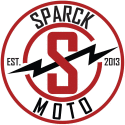Okay, So, I like to bite off way more than I can chew. But I hate, hate, hate having to have anyone else do anything for me on my projects. This brings me to welding. There are a lot of guys here who do their own and a lot of guys who don't. I also get the sense that there are a lot of guys who want to do their own.
Me for one! ;D. Any chance we could get some guys who know this stuff to lay out some info on how to get started and I don't mean, "go on down to the local tech college and take a class. I mean "oh, you want to fuck around with shit that could kill you?! COOL! Here's what you do."
For what we typically do with bikes what do we need for gear and how much should it run? Then maybe some tutorials on how to get started. from there its my old frind trial and error.
Thanks for any help.
Diesel
Me for one! ;D. Any chance we could get some guys who know this stuff to lay out some info on how to get started and I don't mean, "go on down to the local tech college and take a class. I mean "oh, you want to fuck around with shit that could kill you?! COOL! Here's what you do."
For what we typically do with bikes what do we need for gear and how much should it run? Then maybe some tutorials on how to get started. from there its my old frind trial and error.
Thanks for any help.
Diesel




